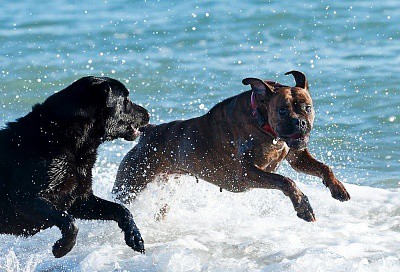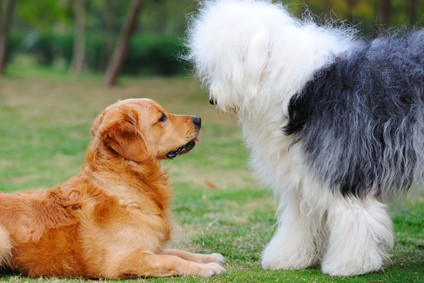
There are things you can do to prevent this behavioral problem, and to help your dog be calm and confident when you aren't home with him.
1. Socialize your Puppy
The first few months of your dog's life are critical when it comes to raising a behaviorally well adjusted dog. Make sure he stays with his mom and litter mates until he is 8 weeks old.
When he is 12-14 weeks of age, take him to a good puppy pre-school to continue his social learning. Use positive training methods and plenty of rewards so he grows up to be confident and try to avoid him becoming too attached to just one person.
2. Give your Dog a Den
Whether this is a crate or a small room such as the laundry, a safe and familiar place to rest will encourage your dog to relax and can often prevent him showing signs of dog anxiety. Dog appeasing pheromone will also help him to feel mellow when he is in there.
Give him a soft bed and some snacks, and always make his den a pleasant place to be. Never use it to punish your dog, or it won't serve its purpose.
3. Use Special Dog Toys
Leave your dog with some special toys when you are out, toys that he doesn't routinely get to play with.
The food dispensing toys are particularly helpful. Look for the Kong Wobbler or the Buster Cube – both toys hold your dog's dry food ration, and will randomly toss pieces of kibble out as he plays with them.
This will keep him occupied and will take his mind off the fact that you're not there with him.
4. Stick to a Routine
Dogs are creatures of habit so stick to a routine where you can. There will be times when this isn't possible.
Events that are traumatic in your dog's eyes, such as a stay in hospital or in a boarding kennel, can trigger dog separation anxiety. However, if you have raised him to be confident and adaptable then he will better cope with changes to his routine.
5. Exercise
Exercise results in a rush of endorphins to your dog's brain, which will leave him feeling calm and relaxed for several hours.

Recent research has suggested that this endorphin high doesn't occur if you take your dog for a walk, he needs to move quicker than that.
If you can take him for a jog or a power walk before you go out, he is much less likely to be stressed when alone.
6. Environmental Enrichment
Environmental enrichment is an important part of keeping your dog happy. This term refers to changing the environment around him so he is able to express normal dog behaviors.
Digging is natural for dogs, so give him a sandpit to dig in and he is less likely to dig in your flower bed.
Tie toys to the washing line with a stretchy cord so he can play tug with them.
Hide treats in small cardboard boxes and allow him to destroy them to get to the snack.
These suggestions will let him be a predator for a little while, and his home alone time will be much more enjoyable for him.
7. Thunder Shirt
Buy your dog a thunder shirt. These are dog coats that are designed to apply consistent pressure to your dog's body. This pressure calms them down, and many dogs are much more settled when wearing their thunder shirt.
8. Spend time with Other Dogs
Dogs are pack animals, and aren't designed to be alone. Give some thought to letting him spend time at a doggie day care center, or arrange to trade dog-sitting with a friend.
9. Add another Dog to the Family
Taking the pack idea a step further, do you have room in your life for a companion dog?

You'll need to choose the right dog and you'll need to be sure you can afford the expenses. However, a canine friend can make a huge difference to a lonely dog.
10. Practice Anxiety Training
If you tend to be a homebody and don't have to go out much, practice short departures on a regular basis (See Training Tips To Eliminate Separation Anxiety in Dogs).
Your dog will learn to get used to you being away for a little while and when you really need to leave him, it won't be such a big deal.
A word of advice
Not all of these suggestions for preventing separation anxiety in dogs will apply to you.
For example:
- Your dog may be older, and the comments about socialization won't be relevant.
- You may not know anyone who could babysit your dog, and
- A second dog might be out of the question.
However, there will be a few that will work for your dog, and will help him to be happy when you're out and about without him.

Calvin is the co-founder and one of the main contributors to dogtemperament.com. He has been an avid dog lover all his life. He enjoys researching and sharing great ideas on how you can avoid common pitfalls of dog ownership and build the most loving and enjoyable relationship with your dog.